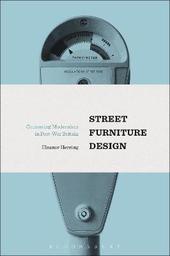
|
Street Furniture Design: Contesting Modernism in Post-War Britain
Hardback
Main Details
| Title |
Street Furniture Design: Contesting Modernism in Post-War Britain
|
| Authors and Contributors |
By (author) Eleanor Herring
|
| Physical Properties |
| Format:Hardback | | Pages:224 | | Dimensions(mm): Height 234,Width 156 |
|
| Category/Genre | Product design
Landscape art and architecture |
|---|
| ISBN/Barcode |
9781474245616
|
| Classifications | Dewey:717.0941 |
|---|
| Audience | | Undergraduate | | Postgraduate, Research & Scholarly | |
|---|
| Illustrations |
60 bw illus
|
|
Publishing Details |
| Publisher |
Bloomsbury Publishing PLC
|
| Imprint |
Bloomsbury Academic
|
| Publication Date |
14 July 2016 |
| Publication Country |
United Kingdom
|
Description
Eleanor Herring's unique study of street furniture in post-war Britain considers how objects which are now familiar parts of our urban environment were designed to populate public spaces. Herring explores the design of lampposts, post boxes, parking meters, and signage in the context of a government backed by various bodies keen to propagate 'good' modern design, in a Britain whose towns and cities had been laid waste by bombing and the privations of war. She also considers the innate conservatism of local communities and councils, wary of a standardised street design imposed from above. She traces how the design of street furniture became the site of a fierce struggle which exposed deep-seated anxieties about class, taste and power. Herring's original research draws on archival material and on interviews with leading figures in urban design, including graphic designer Margaret Calvert and industrial designer Kenneth Grange.
Author Biography
Eleanor Herring lectures in design history at the Glasgow School of Art, Scotland. She has published articles in various edited volumes and conference proceedings.
Reviews[Herring] has done an enormous amount of research to uncover the story of objects that most of us walk past without a second glance. ... [A] fascinating book. * The Glasgow Herald * The book includes a useful select bibliography, is appealingly designed and is generously illustrated ... Street Furniture Design: Contesting Modernism in Post-War Britain is an important account of an overlooked chapter in post-war design history, which also demonstrates that design histories can-and should-include multiple voices. * Journal of Design History * A fascinating and revealing analysis of the controversies and anxieties that surrounded the design of urban environments in post-war England. Using archival and other contemporary accounts, Herring demonstrates how the interplay between a wide array of different players and their contrasting agendas based on class, politics and power, formed and controlled the design of these public spaces. * Dr Clive Edwards, Emeritus Professor of Design History at Loughborough University, UK * Meticulously researched and beautifully written, Street Furniture Design delves into the debates about the aesthetics and ethics of British townscapes in the immediate postwar decades. Eleanor Herring has written a scintillating book about how the often unnoticed world of lampposts, benches and bus shelters gets fashioned. It's a great read. * Dr Ben Highmore, Professor of Cultural Studies at the University of Sussex, UK * Street Furniture Design sheds a clear light on how taste, class and power impact the relationship between public policy and design. Its thorough research presents compelling evidence about the politics of furnishing the street and the privatization of public space. Eleanor Herring has provided a deep and original insight into the way design meets society. You'll see the street differently now. * Professor John Dunnigan, Head of Furniture Design Department, Rhode Island School of Design, USA * A brilliant and entertaining account of a neglected subject, well written, often comic but fundamentally serious history of an important battleground in the war for Good Modern Design in the 20th Century. This will surely become the standard work. * Dr Jules Lubbock, Professor of Art History at the University of Essex, UK * "Street furniture", once central to debates about good design and town planning, has here been treated properly by a meticulous scholar who understands the significance of the subject for design history as a whole. Concentrating on the post war period in Britain, Herring uses street furniture as a lens to elucidate some of the key debates about design and modern urban life. This is an excellent book. * Dr Paul Stirton, Professor of Decorative Arts at the Bard Graduate Center, USA *
|